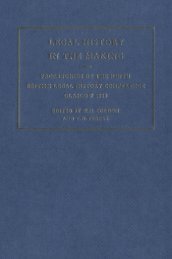130. - Collection Point® | The Total Digital Asset Management System
130. - Collection Point® | The Total Digital Asset Management System
130. - Collection Point® | The Total Digital Asset Management System
Create successful ePaper yourself
Turn your PDF publications into a flip-book with our unique Google optimized e-Paper software.
242 Structure and the Book ofZechariah<br />
in is not a rare word in the Hebrew Bible, but in Zechariah it only<br />
occurs in 1.4 (2x), 15 and 8.14, 17. <strong>The</strong> same may be said of rntf, 1.4;<br />
3.8; 6.15 (2x); 7.11, 12 (2x), 13; 8.9, 23 only. It should be noted that<br />
6.15 is the last verse of the whole of the second part of Zechariah 1-8;<br />
the phrase is emphatic and comprises part of the concluding conditional<br />
promise. <strong>The</strong> reference in 8.23 is slightly different, but it is<br />
interesting that this also is a final verse and, like 6.15, contains a rare<br />
reference to DTI^K. Again these occurrences give some support to conclusions<br />
reached so far concerning the redactor of Zechariah 1-8.<br />
Tttfpn, 1.4; 7.11. <strong>The</strong>se would support our theory, even though two<br />
isolated references are of uncertain value in themselves. <strong>The</strong>y both<br />
refer to the refusal of the Israelites of old to listen to God.<br />
rrn only occurs in 1.5 in Zechariah 1-8, and then in 10.9, 13.3 and<br />
14.8. <strong>The</strong>re is some similarity between the first two of these: 'the<br />
prophets, will they live for ever?' and 'their children shall live and<br />
return'. 1 Zech. 13.3 has 'You shall not live...' which might conceivably<br />
be related; 14.8 'living waters' is quite different. <strong>The</strong> word is not<br />
distinctive enough to build on.<br />
"DJ> gives us little evidence. <strong>The</strong>re is some affinity between 'my<br />
servants the prophets' (1.6) and 'my servant the Branch' (3.8), but the<br />
other instances are different ('those who served them', 2.13; 'tiller of<br />
the soil', 13.5). However, note once again a connection between 1.1-6<br />
and ch. 3.<br />
ntotf. Although a very common word, its occurrence in Zechariah is<br />
limited, and its repetition in 1.6 has a certain emphasis. <strong>The</strong> infinitive<br />
occurs in 1.6 and 2.4 referring to Yahweh's action in judging his<br />
people and to the action of Yahweh's agents (the four smiths) in judging<br />
the people's enemies. 'Make crowns', 6.11, does not seem to be<br />
related to this. In chs. 7 and 8 the reference is to what the people have<br />
done or are to do. In 10.1 the usage is different: 'Yahweh makes the<br />
lightning'. It would be convenient, but also precarious, to claim that<br />
this word also connects 1.1-6 with chs. 7-8.<br />
Five of the next words may be taken together: ZD~I, DID, DYIK, p 1 ?<br />
and "i^nnn. <strong>The</strong>y all have to do with the two visions with horses. <strong>The</strong><br />
first two occur in Zechariah 9-14, all in relation to battle in some<br />
way. n^d, in 9.11, means 'set free'.<br />
IDO is a common verb, but its use here is restricted in certain ways:<br />
1. It does not seem to have been picked up by other commentators.






